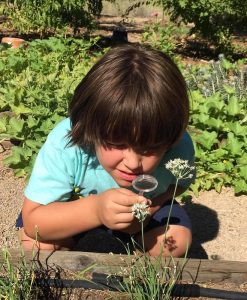Cultivating Knowledge:
Teaching STEAM Through Urban Gardens with Garden-Based Learning
In today’s rapidly evolving world, educators are continually seeking innovative ways to engage students and foster a deeper understanding of complex subjects. One such approach gaining momentum is teaching STEAM (Science, Technology, Engineering, Arts, and Mathematics) through urban gardens using a method called Garden-Based Learning (GBL). This approach not only imparts vital academic knowledge but also connects students with their environment and community. The UrbSTEAM Erasmus+ project exemplifies the transformative potential of this educational strategy.

Urban gardens offer a unique platform for hands-on learning that encompasses various disciplines within STEAM. By planting, nurturing, and harvesting, students gain practical experience in biology, chemistry, and environmental science. Additionally, they can apply mathematical concepts when measuring growth, calculating planting distances, and tracking weather data.
Technology plays a pivotal role in modern education, and urban gardens provide an ideal setting for its integration. Students can employ digital tools to monitor soil moisture, temperature, and sunlight levels, allowing them to collect real-time data for analysis and interpretation. This aligns perfectly with the Erasmus+ UrbSTEAM project, which seeks to advance STEAM education through innovative methods like these.
Moreover, engineering principles come to life as students design and construct irrigation systems, composting bins, and garden structures. These practical applications foster creativity and problem-solving skills, key components of the Arts in STEAM. Urban gardens become a canvas for artistic expression, where students can sketch, paint, and sculpt the natural world around them.
Beyond the academic benefits, garden-based learning cultivates a strong sense of environmental stewardship and connects students to their urban surroundings. By nurturing plants, they develop a deeper appreciation for nature, which is crucial in today’s world of environmental challenges.

The UrbSTEAM Erasmus+ project recognizes the transformative potential of teaching STEAM through urban gardens. It encourages collaboration among educators, fostering the exchange of ideas and best practices. This international initiative promotes the development of innovative teaching methodologies, ultimately enhancing the educational experience for students worldwide.
In conclusion, Garden-Based Learning in urban settings provides a holistic approach to STEAM education. It fosters practical skills, creativity, and a sense of environmental responsibility.
The UrbSTEAM Erasmus+ project exemplifies the power of collaborative efforts to revolutionize education. By teaching STEAM through urban gardens, we are sowing the seeds of knowledge and nurturing the leaders of tomorrow.
